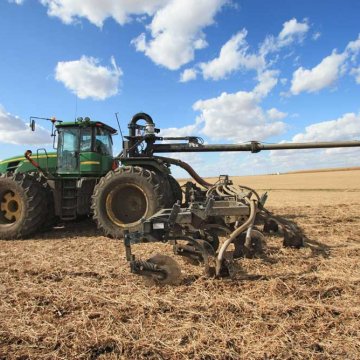MANURE PROVIDES FARMERS AN ALTERNATIVE NUTRIENT SOURCE AMID VOLATILE FERTILIZER MARKET
In the past year, the cost for urea and diammonium phosphate have more than doubled. With no end in sight, some producers are looking at alternatives like manure.
Daniel Andersen, Associate Professor at Iowa State University, says that farmers interested in integrating manure as a fertilizer have the possibility for great outcomes in terms of improved soil health and crop nutrition.
“One of the things I like to say is that manure is a complete fertilizer, but it isn't always a balanced fertilizer,” says Andersen.
Andersen says that some manure will have more phosphate or excess nitrogen, when what the crop really needs is potassium. When deciding whether or not to spread manure, it's important to determine the type of manure necessary for the particular crop type and current soil nutrient makeup. For example, if a farmer has planted a crop that needs a lot of phosphorus, but has soil that is low in phosphorus, they should shop around for nitrogen-rich manure, like poultry.
“Oftentimes manures can be only transported a few miles to keep price competitive with synthetic fertilizers and with a liquid manure that application distance is probably somewhere in the neighborhood of one to five miles that we're willing to move it and still have it be cost competitive with purchasing other synthetic fertilizers,” says Andersen.
Dan Luepkes, a farmer in Oregon, Illinois, has been using chicken manure on his farm for almost four years. Luepkes is part of a few groups that focus on high-yield crops, including XtremeAg, and says some of the members from the south— where the use of chicken manure is more predominant—had been discussing how effective it was on their fields and he decided to give it a shot.
“It's natural versus synthetic fertilizers,” says Luepkes. “Natural fertilizers have no added salt, so it's more usable for the plant. It also contains some additional micronutrients and calcium that you're not getting in synthetic fertilizers unless you buy all those additional micronutrients.”
Luepkes travels up to 100 miles to bring chicken manure to his farm. Because of the distance he has to haul it, he says it is almost as expensive as using synthetic fertilizer. Luepkes brings the manure in and works it into the soil in the fall, partially out of preference and partially because of the manure regulations in Illinois. While the process is expensive, due to the travel distance and equipment–he owns nearly $250,000 of spreading equipment–Luepkas has seen a definite improvement of micronutrients in his field.
Luepkes says that as he has run soil tests after using manure on his fields, he is seeing an increase in microbiology and insect presence, which brings additional carbon to the soil and increases the overall soil health, something Andersen recommends before purchasing manure. As the nutritional value of manure can change from farm to farm and from season to season, a soil test allows farmers to know exactly what nutrients their soil needs and what kind of manure to look for. Andersen also recommends requesting a manure sample from the farm before you buy.
As the use of manure gains in popularity, Andersen is noticing a trend. While producers are using the manure being generated on their farmers or purchasing to spread, they are also exploring other sources to rebuild and maintain soil health, not just to bolster crop growth. Sometimes, a producer's field is in need of extra nitrogen, and the manure they are producing is not nitrogen rich. In these cases, choosing to apply purchased manure that is nitrogen rich, such as poultry, would be a good option.
“I’ve seen some swine producers choose not to put their own manure in portions of their fields and instead use poultry litter to try and build soil health,” Andersen says.
Luepkes says that as he has run soil tests after using manure on his fields, he is seeing an increase in microbiology and insect presence, which brings additional carbon to the soil and increases the overall soil health.
More farmers are asking questions about manure as a source of nutrients for their crops. Luepkes says that while manure is a good way to get nutrients into the soil, it isn’t as simple as just deciding to go out and spread.
“It’s a lot more labor and management intensive,” says Luepkes. “You have to truck it to the farm, spread it. It's pretty hard to hire someone to do that. It's not as readily available as your commercial fertilizers.”
Andersen says when it comes to manure, hitting the right application rate is critical to making more money per bushel. Finding the right application method and the right system are all key to turning a profit in the first few years.

No comments:
Post a Comment